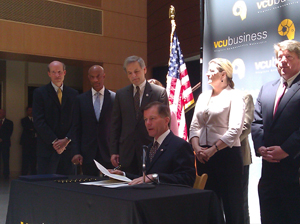 Gov. Bob McDonnell signed into law Wednesday afternoon several bills aimed at encouraging the use of alternative and renewable energy sources.
Gov. Bob McDonnell signed into law Wednesday afternoon several bills aimed at encouraging the use of alternative and renewable energy sources.
McDonnell signed the bills at a ceremony at the VCU School of Business that was attended by students and members of the Virginia Alternative and Renewable Energy Association, which lobbied for the bills.
“We do have a goal of making Virginia the energy capital of the East Coast, and a lot of things need to happen to effectuate that vision,” McDonnell said. “The bills I sign today will create new stepping stones towards that goal.”
McDonnell said that sources such as solar, wind and biomass make up only 3 percent of the total energy used in Virginia.
Among the bills signed was one that creates a Clean Energy Manufacturing Incentive Grant Program. The program will provide financial incentives to companies manufacturing renewable and clean energy technologies. To be eligible, a company must make a capital investment greater than $50 million and create at least 200 full-time jobs. This would include companies making components for nuclear power plants. For wind energy suppliers to be eligible, they must make a capital investment of more than $10 million and create at least 30 full-time jobs.
“We are going after the big projects,” McDonnell said.
Another bill signed was aimed at homeowners: It increases the maximum capacity for participation in a residential net metering program from 10 kilowatts to 25 kilowatts. Net metering allows those who use solar or wind on their home to receive retail credit for the electricity they generate.
The governor also signed into law two companion bills that create the Voluntary Solar Resource Development Fund and require electric utilities to allow customers to make voluntary contributions to the fund. The State Corporation Commission will use the funds to issue grants to nonprofits, businesses and residences for the use of solar energy systems.
 Gov. Bob McDonnell signed into law Wednesday afternoon several bills aimed at encouraging the use of alternative and renewable energy sources.
Gov. Bob McDonnell signed into law Wednesday afternoon several bills aimed at encouraging the use of alternative and renewable energy sources.
McDonnell signed the bills at a ceremony at the VCU School of Business that was attended by students and members of the Virginia Alternative and Renewable Energy Association, which lobbied for the bills.
“We do have a goal of making Virginia the energy capital of the East Coast, and a lot of things need to happen to effectuate that vision,” McDonnell said. “The bills I sign today will create new stepping stones towards that goal.”
McDonnell said that sources such as solar, wind and biomass make up only 3 percent of the total energy used in Virginia.
Among the bills signed was one that creates a Clean Energy Manufacturing Incentive Grant Program. The program will provide financial incentives to companies manufacturing renewable and clean energy technologies. To be eligible, a company must make a capital investment greater than $50 million and create at least 200 full-time jobs. This would include companies making components for nuclear power plants. For wind energy suppliers to be eligible, they must make a capital investment of more than $10 million and create at least 30 full-time jobs.
“We are going after the big projects,” McDonnell said.
Another bill signed was aimed at homeowners: It increases the maximum capacity for participation in a residential net metering program from 10 kilowatts to 25 kilowatts. Net metering allows those who use solar or wind on their home to receive retail credit for the electricity they generate.
The governor also signed into law two companion bills that create the Voluntary Solar Resource Development Fund and require electric utilities to allow customers to make voluntary contributions to the fund. The State Corporation Commission will use the funds to issue grants to nonprofits, businesses and residences for the use of solar energy systems.



So, how will this effect a business like a movie theater that uses solar panels to generate electricity or more electricity than it uses?
Nuclear is not a “clean energy” proposition. The lethally hazardous waste it generates is a thousand fold more harmful to our environment than conventional gas and coal fired energy sources. This is another politician’s attempt to put lipstick on a pig.